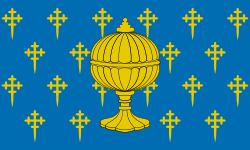Kingdom of Galicia
The Kingdom of Galicia (Galician: [Reino de Galicia, or Galiza] Error: {{Lang}}: text has italic markup (help); Spanish: Reino de Galicia; Portuguese: [Reino da Galiza] Error: {{Lang}}: text has italic markup (help); Latin: [Galliciense Regnum] Error: {{Lang}}: text has italic markup (help)) was a political entity (a state) in southwestern Europe, in a region that today includes parts of northern Portugal and northwestern Spain.
Kingdom of Galicia Reino de Galicia or Galiza (in Galician) Reino de Galicia (in Spanish) Reino da Galiza (in Portuguese) Galliciense Regnum (in Latin) | |||||||||||||||
|---|---|---|---|---|---|---|---|---|---|---|---|---|---|---|---|
| 910–1833 | |||||||||||||||
| Motto: | |||||||||||||||
| Anthem: | |||||||||||||||
| The location of the Kingdom of Galicia in the 11th century CE, in red The location of the Kingdom of Galicia in the 11th century CE, in red | |||||||||||||||
| Capital | Santiago de Compostela1 | ||||||||||||||
| Common languages | Latin Vulgar Latin Galician-Portuguese Castilian A few speakers of Brittonic, Visigothic, Vandalic and Suebic | ||||||||||||||
| Religion | Roman Catholicism | ||||||||||||||
| Demonym(s) | Galician | ||||||||||||||
| Government | Monarchy | ||||||||||||||
| Monarch | |||||||||||||||
• 409–438 | Hermeric (first) | ||||||||||||||
• 1813–1833 | Ferdinand VII (last) | ||||||||||||||
| Legislature | Junta | ||||||||||||||
| History | |||||||||||||||
• | 910 | ||||||||||||||
• | 1833 | ||||||||||||||
| |||||||||||||||
History
Galicia was first part of the Roman province of Gallaecia and it became a kingdom under the Germanic Suebi in the 5th century, and later, from 585 to 711, it was integrated into the Kingdom of the Visigoths.
In the 8th century Galicia became a part of the newly founded Christian kingdoms of the northwest of the peninsula, sometimes called Galicia or derivates,[1] and others Asturias and León. Sometimes it got independence under its own kings.[2] Rulers were titled as "Kings of Galicia" even when they governed from cities like Oviedo or León. This has led to significant historiographical controversy.[3]
Compostela became the capital of Galicia in the 11th century. The independence of Portugal (1128) made its southern boundary. The accession of the Castilian King Ferdinand III to the Leonese kingdom in 1230 brought Galicia under the control of the Crown of Castile. The kingdom of Galicia was now a political division in the larger realm, but it continued to maintain a distinct cultural identity.
Kingdom Of Galicia Media
- Ariamirogaliza.jpg
Theodemar (or Ariamir), king of Galicia with the bishops Lucrecio, Andrew, and Martin. Codex Vigilanus (or Albeldensis), Escurial library
- Cvp-00791-109v.jpg
Miro, king of Galicia, and Martin of Braga, from an 1145 manuscript of Martin's Formula Vitae Honestae, now in the Austrian National Library. The book was originally dedicated to King Miro with the header "To King Miro, the most glorious and calm, the pious, distinguished for his Catholic faith"
Monastery of San Pedro de Rocas, Galicia, founded in 575 and inhabited until the early 20th century
- Muralla.Lugo.Galicia.jpg
- Europe-600.jpg
Political map of southwestern Europe around the year 600, which referred to three different areas under Visigothic government: Hispania, Gallaecia, and Septimania.
- Iglesia de Santa Comba de Bande.jpg
Church of Santa Comba de Bande, built c. 7th century, rebuilt in the 9th century after being ruined for more than 200 years.
Tombstone of the sepulcher of bishop Theodemar of Iria (d. 847), discoverer of the tomb attributed to apostle Saint James the Great
- Vimaraperes.jpg
Statue of Vímara Peres, conqueror of Porto in 868
- Dragon ships in Catoira.JPG
Modern replicas of Viking ships by the castle of Torres de Oeste, Catoira
Related pages
References
- ↑ Many ancient and medieval documents consistently refer to the region as Gallaecia or its derivatives such as Gallizia, Gallitia, Galizuland, Yilliqiyya, Jalikia, etc. but translated into "Asturias" or "Leon", as explained in Kingdom of Galicia in historiography.
- ↑ Rodríguez Fernández, Justiniano (1997). García I, Ordoño II, Fruela II, Alfonso IV. Burgos: Editorial La Olmeda. ISBN 84-920046-8-1.
- ↑ As a result, the legacy of the Kingdom of Galicia and its rulers is often contested in academic circles.
Other websites
- Culture and Society in Medieval Galicia. A Cultural Crossroads at the Edge of Europe James D'Emilio. University of South Florida

